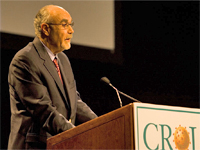Dr. Robert Abrams, associate professor of clinical psychiatry, was named the 2007 Clinician of the Year by the American Association for Geriatric Psychiatry (AAGP). The award acknowledges Dr. Abram's commitment to ensuring access to quality mental health care for older adults. The award was presented at the AAGP's 20th Annual Meeting, in New Orleans, on March 1–4. "I feel especially honored to receive this award," said Dr. Abrams. "Even if one is a researcher, an administrator, or a health policy expert, at the end of the day, it's all about our patients."

Gaorav Gupta
Gaorav Gupta, a Ph.D. candidate in cell biology and genetics, has been named a recipient of the 2007 Harold M. Weintraub Graduate Student Award from the Fred Hutchinson Cancer Research Center. The award recognizes outstanding achievement during graduate studies in the biological sciences. Nominations were solicited internationally; the winners were selected on the basis of the quality, originality and significance of their work. Gupta, whose thesis research focuses on breast cancer metastasis to the lungs, will be participating in the award symposium on May 4–5 at the Hutchinson Center in Seattle. The award, established in 2000, honors the late Dr. Harold Weintraub, an international leader in the field of molecular biology; among his many contributions, he identified genes responsible for instructing cells to differentiate, or develop, into specific tissues such as muscle and bone. The Fred Hutchinson Cancer Research Center is an independent, nonprofit biomedical-research institution and is one of 39 National Cancer Institute–designated comprehensive cancer centers nationwide. Gupta's award marks the second year in a row that a student from the Graduate School has received this prestigious honor.
Dr. Tong H. Joh, professor of neurobiology in neurology and neuroscience, has been awarded the prestigious 2007 Julius Axelrod Award in Pharmacology from the American Society for Pharmacology and Experimental Therapeutics (ASPET). The award is given to recognize outstanding scientific contributions in research and mentoring. Dr. Joh's research studies focus on characterizing dopamine (DA) neuronal plasticity, biochemistry, and genetic analysis of catecholamine biosynthesis, especially DA biosynthesis, and molecular and cellular mechanisms that underlie DA neuronal degeneration. Dr. Joh will deliver the ASPET-Julius Axelrod Award lecture, titled "Phox and Nox and ROS in a Box of Dopaminergic Neurodegeneration: Roles of MMP-3," on April 29 at the Washington Convention Center at the Experimental Biology Conference in Washington, D.C. His award will be presented at the ASPET Business Meeting on April 28 at the Washington Convention Center.
Dr. Harvey Lincoff, professor emeritus of ophthalmology, was honored by the faculty of ophthalmology at University Hassan II in Casablanca, Morocco, for his unprecedented contributions in the field. An internationally recognized specialist in retinal diseases, Dr. Lincoff received a gold medal from the university. He addressed the faculty and an invited Moroccan audience on his method of minimal surgery for the correction of retinal detachment and on aspects of age-related macular degeneration.

Dr. David Lyden (left) greets Portuguese Republic President Aníbal Cavaco Silva at the BIAL Foundation Award Ceremony in Porto, Portugal, March. 28.
Dr. David Lyden, associate professor of pediatrics and cell and developmental biology, has been cited with distinction for his work "The Genetic and Cellular Regulation of Adult Bone Marrow Stem Cells in Tumor Vasculogenesis and in the Formation of the Pre-Metastatic Niche" from the BIAL Foundation. The BIAL Foundation, sponsored by the president of the Portuguese Republic, the Council of Rectors of the Portuguese Universities, and the Portuguese College of Physicians and Surgeons, recognizes intellectual written works on any freely chosen medical topic. Research must be of the highest quality and be of important scientific relevance to meet the eligibility conditions. The BIAL Award ceremony took place on March 28 in Porto, Portugal, and was presided by the president of the Portuguese Republic, Aníbal Cavaco Silva.
Dr. Marcus Reidenberg, professor of medicine, public health and pharmacology, was elected chairman of the World Health Organization's Expert Committee on the Selection and Use of Essential Medicines at its meeting at WHO headquarters in Geneva, Switzerland, on March 19–23. The WHO Essential Medicines program was started in 1976 to establish the essential-medicines concept: that a limited list of medicines must meet the medical needs of the vast majority of a population and be purchased and made available to everyone in the population before money is spent purchasing other medicines. One hundred and fifty-six countries have adopted this concept in principle. This essential-medicines list, now including over 300 drugs, is used as a purchasing list by many countries with limited resources that are helped by this international expert advice. Dr. Reidenberg has served on the Expert Panel and Expert Advisory Committee since 1989.

Dr. Jean Pape delivering the N'Galy-Mann Lecture in Los Angeles, Feb. 25.
Dr. Jean Pape, professor of medicine, delivered the inaugural N'Galy-Mann Lecture at the 14th Conference on Retroviruses and Opportunistic Infections (CROI) in Los Angeles, Feb. 25–28. Dr. Pape is the founder of Haiti's GHESKIO (Groupe Haitien d'Etude du Sarcome de Kaposi and des Infections Opportunistes), which has championed education, health care and HIV research, and which has worked closely with Weill Cornell since its inception in 1982. The N'Galy-Mann Lecture honors the late Dr. Bosengé N'Galy and the late Dr. Jonathan Mann, both of whom were pioneers in the education of and fight against HIV/AIDS. Dr. Pape's lecture, "Intersection of Research and Clinical Care: The Cornell-GHESKIO Experience in Haiti," may be viewed on the CROI Web site: www.retroconference.org/2007.

